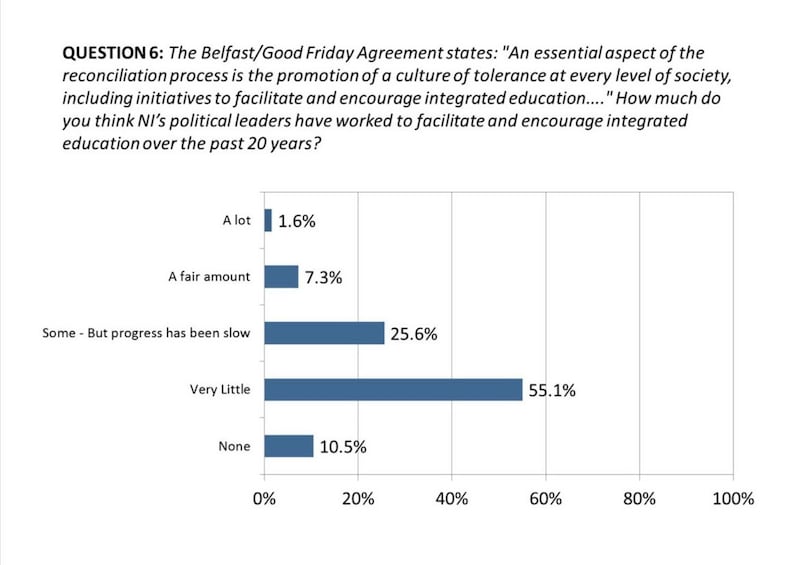POLITICIANS and the influence of churches are major factors holding up the growth of integrated education, a new survey has found.
A Northern Ireland-wide poll concluded that political leaders had done little or nothing to encourage integrated schooling since the Good Friday Agreement almost 20 years ago.
A survey carried out by LucidTalk and commissioned by the Integrated Education Fund (IEF) also revealed "an appalling picture of poverty in schools".

The `attitudinal poll' sought to research views on the current state of education in the north and explore possible ways forward.
Cash strapped schools have been warned to urgently review their budgets and make difficult decisions after learning there is no extra money coming. Many schools are already struggling to stay in the black.
The IEF said political stalemate at Stormont, coupled with this financial crisis, meant the agreement's anniversary came at a particularly challenging time. It was therefore "relevant and appropriate" to seek the public's views on the education offered to young people and on the opportunities for reform.

Almost two-thirds of those polled said political leaders had done little or nothing to facilitate and encourage integrated education in the years since the Good Friday Agreement. Currently only around eight per cent of pupils in Northern Ireland go to integrated schools.
Asked what they thought had held up the growth of integrated education, parents also said the influence of Churches was to blame.
More than 80 per cent agreed there should be an independent, root and branch review of the way that education was planned and delivered in Northern Ireland, "to make recommendations for improved efficiency and effectiveness and to ensure the best outcomes for all children".
The majority of the 1,520 people responding said they would support changes to the system to make better use of the budget.

In answer to the question "How do you think the Department of Education and Department of Finance should act to ease the pressures?" the most popular option was merging small or undersubscribed schools.
Almost 80 per cent of respondents said they would support cross-community mergers to save money.
A large number of parents said they had seen the impact of funding pressures at schools, even before the latest budget announcement.
The poll found that parents had to supply basic stationery items, pupils were being sent home early, teachers were being made redundant and fundraising requests were made to pay for painting and maintenance.
IEF chief executive Tina Merron said the responses from parents presented an appalling picture of poverty in schools.
"It is distressing to think that money for education is not being spent on meeting the needs of pupils and I am convinced that the existing budget could be used more effectively and spread less thinly. If school provision was rationalised we could spend what we have where it is most needed – to support pupils’ learning and ensure a good educational environment," she said.
"Interestingly, there is overwhelming support – almost 80 per cent - for merging schools on cross-community lines. This would bring both economic and social benefits, allowing children and young people to learn and grow beside others of all backgrounds and traditions in well-resourced and well-maintained buildings. Parents are being asked to meet the costs of division in education and that is unsustainable and unacceptable."
Survey paints picture of impact of budget cuts
By Tina Merron, chief executive of the Integrated Education Fund
THE responses from parents in this survey paint a picture of the impact of budget cuts in schools.
It is obvious that the budget could be used more effectively if it were spread less thinly. If school provision were reviewed and reformed, we could spend what we have where it is most needed:in schools, to ensure a good, all-round education in a well-maintained environment.
Parents are being asked to meet the costs of division in education and that is unsustainable and unacceptable.
The LucidTalk research gives a strong indication that parents would accept changes to the structure of the education system, if it meant that public money were used more efficiently to give all children better educational outcomes.
An important point to emerge from this poll is that, for most parents, the standard of education offered is their priority when choosing a school. This is closely followed in importance by the quality of the buildings and the distance from the child's home.
Parents want to see good sports and cultural provision and extra help to meet special needs - and all these come a long way above considerations of ethos or management.
So the assumption that it is important to sustain several sectors is holding us back from reform and improvement, and costing us dearly.
It is also impacting on other areas of public expenditure. Since education spending is prioritised (alongside health) isn't there a moral imperative for this money to be used wisely rather than spent on an inefficient and expensive structure?
Currently we are all paying for duplication of provision - resulting in thousands of empty school places - and for duplication of management bodies with claims on the Department of Education's funds.
There is evidence in the poll responses that the public acknowledges the need to change the way we deliver education. There is overwhelming support - almost 80 per cent - for merging schools on cross-community lines.
Streamlining schools provision would go a long way to easing financial pressures. Streamlining provision on a cross-community basis, with the appropriate development of curriculum and teacher training, could result in a pattern of education delivery where everyone feels a sense of both belonging and ownership regarding their local school.
This would support the aim in the draft Programme for Government of building a "diverse, harmonious and confident society".
Stormont politicians have failed to deliver this. Now we have a budget imposed from London and no NI education minister.
The recent Department of Finance budget briefing acknowledged the need for radical changes – "transformation" – to the education system. But there is no plan in place for achieving this. In the absence of progress it should not be surprising that the survey showed a strong call for a Bengoa-style review.
Asked "should there be an independent, root-and-branch review of the way that education is planned and delivered in NI, to make recommendations for improved efficiency and effectiveness", 90 per cent of those expressing an opinion said yes.








